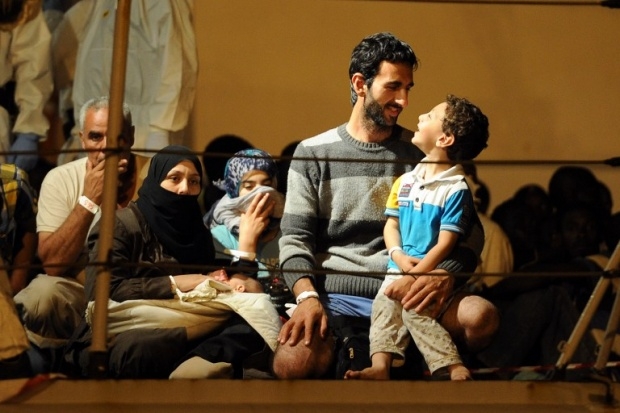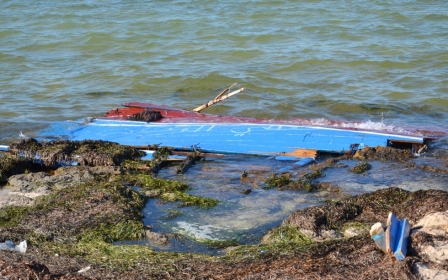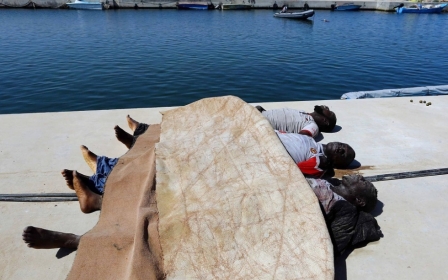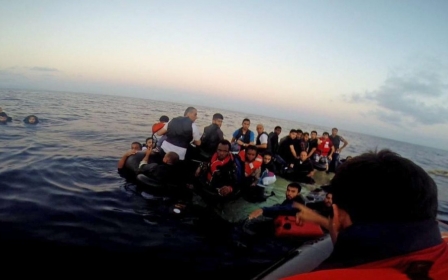Migrant tragedies: Mourning the death of Mahmoud Fathy Younis

ALEXANDRIA, Egypt - It is a bumpy hour-long microbus ride from Tahrir Square to the farming town of Qanater. The River Nile is rarely out of sight as the driver jolts his way over motorways, under bridges; between suburban slums and then sparse farmers' fields. As the sun sets in Qanater, the Nile is waiting for us.
Here, in a secluded village on the outskirts of the town, a group of families are grieving for sons and brothers lost in the Mediterranean Sea, a far-off, faceless landscape made real by news bulletins and memories. In Alexandria, the Gaza Strip, Yarmouk camp in Syria; there are families touched by the same tragedy. Some of them have never even seen the sea.
Abdelrahman's brother was on the 6 September boat which sailed from close to Damietta on the north-east edge of the Nile Delta, and days later, an unimaginable tragedy at sea.
"This is Mahmoud," he said, passing a mobile telephone across the table. It is a picture of a teenager smiling on a beach.
Fourteen year-old Mahmoud Fathy Younis and five others left the village in the first week of September. They wanted to reach Italy for work, prepared to face the well-known risks at sea for better opportunities in Europe.
On 6 September, the journey by road took them to the mouth of the river beside which Mahmoud's older brother, Abdelrahman now sits.
"His life here was miserable. [Mahmoud] knew that even if he kept up his studies, he wouldn’t find a decent job," he says. Rather than waiting to find out, Mahmoud contacted a smuggler.
After the boat sailed, Abdelrahman managed to speak to Mahmoud on his mobile for the first two days. They were at sea but fine, he says, remembering those final conversations.
However, on 10 September, unbeknownst to Abdelrahman, everyone on Mahmoud's boat was ordered by the smugglers to change vessels for the fourth time in as many days. They refused. It was a small, rickety fishing boat and didn't look like it was going to hold everyone. A fight broke out.
According to survivors interviewed by the International Organisation for Migration (IOM), the smugglers, on a separate boat, then rammed the vessel carrying the migrants several times until it sank. An estimated 500 people on board drowned, including 300 concealed in a lower deck as the boat went down. Trapped, they would have died almost immediately.
'Unsafe and illegal journeys'
The Malta tragedy, the "worst shipwreck in years" according to an IOM statement that suggested it constituted "mass murder," shocked Europe. It shocked Europe in much the same way the October 2013 tragedy off Lampedusa shocked Europe. Today, Europe is still shocked.
And yet, its governments have failed to provide enough migrants with safe alternatives to stem the tide of irregular migration across the Mediterranean, which has seen around 130,000 people arrive on southern Europe's shores and cost the lives of more than 3,000 people this year alone.
Some experts suggest there are ways to provide safe alternatives and create avenues for "legal migration," such as family reunification programmes, humanitarian admission or temporary resettlement.
"Countries should consider all the ways possible to bring refugees into Europe through safe and legal routes, rather than allowing them to risk their lives in unsafe and illegal journeys," argues Cynthia Orchard, an attorney working with BADIL (the Resource Centre for Palestinian Residency and Refugee Rights). Orchard recently co-authored a policy briefing by Oxford University's Refugee Studies Centre (RSC), “Protection in Europe for Refugees from Syria,” urging European countries to do much more to help the three million Syrian refugees displaced by war, repression and poverty.
"The problem is, there are so few places." For example, around 96 percent of the three million Syrians externally displaced now reside in neighbouring host states, such as Lebanon, Jordan and Egypt. The rest are in Europe and, according to the latest UNHCR figures for October 2014, Europe has resettled just one percent of the Syrian diaspora.
“A normal thing to happen”
6 September was one of the worst shipwrecks in recent history. But tragedies, large or small, are routine.
Late last month, 26-year-old Palestinian, Wael Adeeb Shahwan left the Gaza Strip for Alexandria, smuggled through the tunnels and on the high seas. This week his mother, who asked only to be named as Umm Wael, recounted his story, dressed in black.
One night around 20 September, Wael was smuggled onto a boat near Alexandria. The smugglers had stolen everyone's bags and mobile phones, meaning Wael - a diabetic - did not have his insulin.
"We lost contact with them, because the smugglers took all their phones," Umm Wael said. "After three days, he would have been going in and out of consciousness."
"His friends were trying to keep him alive. One of the people with [Wael] said that he woke up in the middle of the night, and Wael was sleeping next to them. Then, the next morning, he was nowhere to be found on the boat." Did the smugglers throw him overboard?
Wael's older brother, Wassem, called the smugglers, who told him the group had already arrived in Europe. But something didn't seem right.
Wael's story only came to light after their boat was apprehended by the Egyptian Navy and brought back to shore. Several Palestinians on the same trip were then deported back to Gaza, and told the whole story to Wassem, who had originally made contact with the smugglers. That took weeks. Wael has still not been found.
"We haven't lost hope yet. Even though most of the witnesses claim Wael was thrown overboard and disappeared from the boat," his mother said.
"We're still searching for him."
Silence and collusion
While families often blame these smugglers for taking their relatives away full of empty promises, they also criticise governments for not doing enough in response – or even colluding with smuggling networks.
“The [Egyptian] government seems to be treating this like it’s a normal thing to happen,” claimed Abdelrahman.
"We haven't received any help," adds Umm Wael, "especially because whole thing's illegal. [Wael] came from Gaza illegally and left Egypt illegally. So the Egyptian authorities say it's not their problem, basically."
Dr. Kamel al-Massry, from Gaza, lost 10 relatives on the same boat as Mahmoud Fathy Younis. He now represents the families of the missing.
"We started the Facebook page because no one was speaking in our names," claims Massry. "We were left alone by all of the governments."
The Facebook page has so far collected at least 400 names lost on the 6 September boat – most of the Gazans – but it also publishes information about missing migrants as and when capsizes or disappearances happen, as well as prayers and messages of support.
"Our demand is to treat this as a case of murder," said Massry, who blames both Arab and European governments for not doing enough to locate the bodies and bring those responsible to justice. "We want an international investigation to come from the United Nations and foreign governments, like what happened with the Mavi Marmara incident in 2010."
"We have information about the smugglers and people responsible, but the governments haven't done anything yet." They plan to pass on the smugglers' details to international authorities.
Other refugee families claim governments are actually collaborating with smugglers, a long-standing allegation used to explain disappearances, migrants’ detentions and a seeming lack of movement by the Egyptian authorities. Rumours abound of Egypt's three main smuggling bosses, two Egyptian and one Syrian – “The Doctor,” “The General” and “Abu Hanafy.” Their real identities are unknown, although refugees and migrants frequently claim all three have healthy connections with the Egyptian security apparatus.
Abdelrahman is in little doubt.
"Even if I found out a specific person who was responsible for my brother's death, I know very well that if the police arrested him, he'd be out again in a month to do the same job."
"This is mentally exhausting," Abdelrahman sighed. "But I want to see them in jail, taking the right punishment for what they have done - killing these people."
Other refugees make similar allegations. Umm Mostafa is the sister of Emad, a Gazan Palestinian refugee seriously injured last month after an Egyptian army officer allegedly shot dead a Syrian migrant, Oraby Mahmoud Abd El Qader, while in custody after being caught on the beach. The bullet hit Emad in the back after passing through the neck of Abd El Qader, who then bled to death on the beach under the watch of his entire family and army troops, according to eyewitnesses.
Umm Mostafa said that after the incident, a smuggler was arrested along with the migrants and taken to Anfoushy Detention Centre in Alexandria. He was released after three days, she claimed.
"I don't know how. I'm guessing he has connections."
This trip was organised by the same smuggler as the 6 September boat, Abu Hammada, purportedly a Palestinian-Syrian man who has gotten rich off people smuggling, and another shadowy figure rumoured to have connections with Egypt's security services, according to the families of survivors and an investigation by The Guardian.
Nobody knows for sure. The end result is that families of refugees feel there is almost no one to turn to.
Ultimately, closure is the most important thing for them. Without an investigation, news or the bodies of their loved ones, that can never happen.
"I've been trying to send a message to the smugglers during my search that I don't want to harm them or get them in jail, I just want to know where Wael is," his mother said, before breaking down into tears.
Abdelrahman appears to blame himself for Mahmoud's disappearance. "I'm already guilty enough for letting [Mahmoud] go on a boat like that," he explained. But he is committed in the search for justice and the body of his lost brother, regardless of the risks.
"All that I want…I don't want them to bring him back alive – all I want is to give me his body. I want to be able to honour Mahmoud."
Deyaa Adel contributed to reporting
New MEE newsletter: Jerusalem Dispatch
Sign up to get the latest insights and analysis on Israel-Palestine, alongside Turkey Unpacked and other MEE newsletters
Middle East Eye delivers independent and unrivalled coverage and analysis of the Middle East, North Africa and beyond. To learn more about republishing this content and the associated fees, please fill out this form. More about MEE can be found here.




